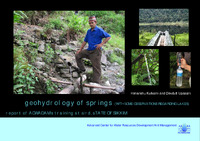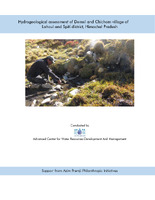Items
Tag
Springs
-
 SPRINGS : IMPORTANT HYDROGEOLOGICAL ASPECTS Springs are vital hydrogeological resources shared among users, with access often through common sources. Effective management requires mapping and characterizing springs, assessing their geological features, and monitoring factors like discharge and water quality. Community involvement is crucial for data collection and decision-making in spring management. Springs vary greatly in their discharge characteristics and aquifer types, influencing their recharge dynamics and water quality. Strategies for capacity building include planning interventions for recharge and protection, ultimately aiming for sustainable use of these essential water sources.
SPRINGS : IMPORTANT HYDROGEOLOGICAL ASPECTS Springs are vital hydrogeological resources shared among users, with access often through common sources. Effective management requires mapping and characterizing springs, assessing their geological features, and monitoring factors like discharge and water quality. Community involvement is crucial for data collection and decision-making in spring management. Springs vary greatly in their discharge characteristics and aquifer types, influencing their recharge dynamics and water quality. Strategies for capacity building include planning interventions for recharge and protection, ultimately aiming for sustainable use of these essential water sources. -
 Introduction to springs The document discusses the significance of springs, particularly in India, highlighting their role as natural groundwater discharge points that sustain streams and rivers. It outlines the extensive presence of springs across various regions, including the Himalayas and Western Ghats, and notes the lack of comprehensive data on groundwater resources. Springs are categorized into different types based on their formation processes, such as depression, fracture, and karst springs. The text emphasizes the need to shift focus from viewing groundwater merely as a source to understanding it as a vital resource, advocating for improved monitoring and management practices to ensure water quality and availability.
Introduction to springs The document discusses the significance of springs, particularly in India, highlighting their role as natural groundwater discharge points that sustain streams and rivers. It outlines the extensive presence of springs across various regions, including the Himalayas and Western Ghats, and notes the lack of comprehensive data on groundwater resources. Springs are categorized into different types based on their formation processes, such as depression, fracture, and karst springs. The text emphasizes the need to shift focus from viewing groundwater merely as a source to understanding it as a vital resource, advocating for improved monitoring and management practices to ensure water quality and availability. -
 Spring profile report_ SIKKIM The ACWADAM report highlights the critical water shortage faced by higher-elevation hamlets in Sikkim, particularly during droughts when springs dry up. It emphasizes the need for effective springwater management, especially given the evidence of depletion due to lifestyle changes and climate impacts. The report details the training of field facilitators on spring identification and recharge techniques, showcasing various springs like Chukudum, Lampatey, and Devithan, which illustrate the hydrogeological complexities involved. The Dhara-Vikas program is presented as a promising strategy to enhance aquifer recharge and revive diminishing water resources, including hilltop lakes.
Spring profile report_ SIKKIM The ACWADAM report highlights the critical water shortage faced by higher-elevation hamlets in Sikkim, particularly during droughts when springs dry up. It emphasizes the need for effective springwater management, especially given the evidence of depletion due to lifestyle changes and climate impacts. The report details the training of field facilitators on spring identification and recharge techniques, showcasing various springs like Chukudum, Lampatey, and Devithan, which illustrate the hydrogeological complexities involved. The Dhara-Vikas program is presented as a promising strategy to enhance aquifer recharge and revive diminishing water resources, including hilltop lakes. -
 Hydrogeological assessment of Demul and Chicham, Spiti The hydrogeological assessment of Demul and Chicham villages in the Spiti Valley, Himachal Pradesh, highlights significant challenges related to water sources amidst climate change impacts. Springs serve as the primary water supply for local communities, providing essential drinking and irrigation water. However, the region has seen a decline in spring discharge due to changes in precipitation patterns, particularly reduced snowfall. This situation has raised concerns about sustainable livelihoods in these villages, prompting an initiative by Ecosphere and ACWADAM to identify potential recharge areas for aquifers that feed these vital springs. The study documented over ten springs in both villages, with water quality testing indicating varying levels of Total Dissolved Solids (TDS) and salinity. While some springs met drinking water standards, others showed elevated pH levels, necessitating further investigation into potential contamination sources. The report suggests implementing recharge structures, such as trenches and percolation pits, in identified recharge zones to enhance groundwater levels. These efforts aim to mitigate the adverse effects of climate change on water availability, ensuring that local communities can maintain their livelihoods in an increasingly unpredictable environment. In conclusion, the delicate ecosystems in the Spiti Valley are facing mounting pressure from climate change, leading to a water crisis that threatens the sustainability of Demul and Chicham villages. With changing snowfall patterns and rising temperatures, proactive measures are essential to secure water supplies through innovative interventions. The collaboration between local communities and organizations like Ecosphere illustrates a commitment to balancing conservation and development, ultimately fostering resilience against ongoing climate challenges while supporting sustainable livelihoods in the region.
Hydrogeological assessment of Demul and Chicham, Spiti The hydrogeological assessment of Demul and Chicham villages in the Spiti Valley, Himachal Pradesh, highlights significant challenges related to water sources amidst climate change impacts. Springs serve as the primary water supply for local communities, providing essential drinking and irrigation water. However, the region has seen a decline in spring discharge due to changes in precipitation patterns, particularly reduced snowfall. This situation has raised concerns about sustainable livelihoods in these villages, prompting an initiative by Ecosphere and ACWADAM to identify potential recharge areas for aquifers that feed these vital springs. The study documented over ten springs in both villages, with water quality testing indicating varying levels of Total Dissolved Solids (TDS) and salinity. While some springs met drinking water standards, others showed elevated pH levels, necessitating further investigation into potential contamination sources. The report suggests implementing recharge structures, such as trenches and percolation pits, in identified recharge zones to enhance groundwater levels. These efforts aim to mitigate the adverse effects of climate change on water availability, ensuring that local communities can maintain their livelihoods in an increasingly unpredictable environment. In conclusion, the delicate ecosystems in the Spiti Valley are facing mounting pressure from climate change, leading to a water crisis that threatens the sustainability of Demul and Chicham villages. With changing snowfall patterns and rising temperatures, proactive measures are essential to secure water supplies through innovative interventions. The collaboration between local communities and organizations like Ecosphere illustrates a commitment to balancing conservation and development, ultimately fostering resilience against ongoing climate challenges while supporting sustainable livelihoods in the region.
